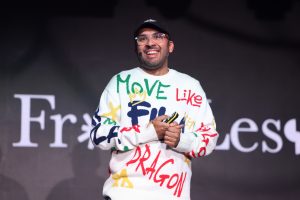
STEVEN APAMPA Q&A
What role does collaboration play in your creative process?
It’s absolutely key. I think it’s the scaling of an idea. As an individual, you can have an idea, but more often than not, you haven’t got all of the resources to actually bring it to life in the way that’s going to make an impact. From a professional point of view, working for a big company like [Nike], you work with a lot of industry experts – we sit in what we call cross-functional teams – and you’re looking at things from many perspectives.
I would say the creative process is a little bit like a dice: there are many sides to it, and you need to maximise all of those sides to really get the best out of your idea. There are so many aspects to bringing a product or an idea or a concept to life, and even personally, through doing my podcast as well. Networking is a form of collaboration too and I think everybody knows the value of that. Bringing many parts together in order to end up with something way bigger than what one individual thought the idea could be at the start.
To be an effective collaborator, it’s vital to have humility. You need to have the attitude that you do not know everything, despite what you might think. You have to be humble enough to want to hear from other people and bring them into the process. Also trust is really important. You have to trust other people to understand your vision and also for you to trust that they maybe know things that you don’t. Finally, patience. People communicate and express their visions in different ways and if you’re not patient, you can miss out on an opportunity to collaborate. It requires emotional intelligence to unlock the best out of everybody in a team.
Why do you think it is so important for diverse voices and experiences to be represented in creative endeavour?
I’ll give you an analogy… if I’m looking at a picture from a certain position, there’s a limit to what I can see. Someone else standing in a different position, they’ll see the picture differently. It will enrich what I can see by understanding what the other person can see too. The picture becomes bigger and you get a 360-degree view. I think the consequence of not having that means that the work is very one dimensional, and it’ll limit it’s impact.
By having different voices, different opinions, you’re tossing more points of view, more perspectives, more richness, into the melting pot. It’s like trying to cook something with one ingredient – you’re going to get a very basic and one-dimensional meal.
How is tech influencing your own creativity, both now and in the future?
Tech is a big disruptor. We saw that through the pandemic, when we were all forced inside, and you saw how quickly the marketplace changed. You saw how content changed. You saw how communication changed.
I think it’s true in sport too. It’s giving people different ways to watch and consume sport. We’re now actually watching watch-alongs. Watching other people, watching sport and being entertained. You’re also able to have more direct relationships with players through their social media. You’re able to play FIFA and get to know players on a different level virtually as well. So it’s really disrupted the industry, and led to new ways to consume, watch and play sport. It’s also created a narrative around how we view athletes. Previously, footballers were mainly judged by what we saw with our eyes… does the player look good, is he performing well? Now, we have huge amounts data available: XG (expected goals), passes made and completed and so on. The great debate in football now is “are we over relying on stats?”
[Tech] helps us to understand athletes far more, what their needs are, their stress points, and that ultimately helps us to make a better product. The information should help you to make better-informed decisions, which should improve services and products.
On the negative side, we’ve seen certain athletes have to take breaks from social media, in order to sort out their mental health. In Europe, we see a restriction on athletes showing who they really are. I think in America, it’s kind of the opposite. They embrace the media, good or bad. They’ve got a bit more protection there, so they’re able to express themselves in a way that is very entertaining and actually produces the characters that fans actually want. It’s kind of funny, because fans want athletes to be more real, more themselves, but at the same time they hammer them to the point where they don’t express themselves. It can be a very toxic relationship in that respect. We want them to be themselves, but if they should go and have a Chinese meal after a loss, we’re asking why they’re not just eating bread and water!? There’s this kind irrational thinking, which is, I think, very unique to football and its tribal culture.
What creative projects have you got coming up that you’re particularly excited about?
I’m really excited about the athletes we’ve got [at Nike], and the opportunities we have to communicate and engage with our consumers, with our fans, in a different way. The opportunity to use technology to disrupt storytelling and to bring those stories to life in unexpected ways. One [project] that the team recently launched is on EAFC, where they have a Nike Stadium based on the design of the Mercurial football boot.
Another prospect is seeing the physical and digital worlds coming together through online gaming platforms and eSports. It’s never a case for us of fighting these things, more embracing where consumers are going. I think the definition of sport is evolving. We saw that in the Olympics, with the attempt to have breakdancing in there. The Olympics is always a good gauge of where sport is at in terms of all the new sports that have been added.
I think the growth of YouTubers has also been fascinating – they’ve almost become athletes in their own right. You see people like IShowSpeed, who’s touring the world and the effect is as if the Beatles were in town! It’s the continual growth of sport and what that means. It’s touching more people in so many new and different ways.
Steven is appearing at Blend Barcelona on 8th November 2024. He’s is a panelist in a Studio Session discussing what it takes to be a creative leader and forward thinker in 2024.
Interview conducted on 19th September 2024.
Blog Category
- PULSE
- News
- Press Release
- Q&A
Latest Blog
Permission to Play: Manon Dave on Creativity and the Power of Play
Manon Dave sharing his journey, philosophy on creativity, and an...
Read MoreOctober 2024: Gaza art installation confirmed
New Barcelona-based creative industry festival Blend is set to have...
Read MoreOctober 2024: GucciGhost to headline Blend
Exciting new Barcelona-based creative festival Blend set to showcase unseen...
Read MoreSeptember 2024: Creative industry backs new festival
Major global powerhouses Nike, Snapchat and Ogilvy have joined key...
Read More
 CA
CA
 ES
ES

